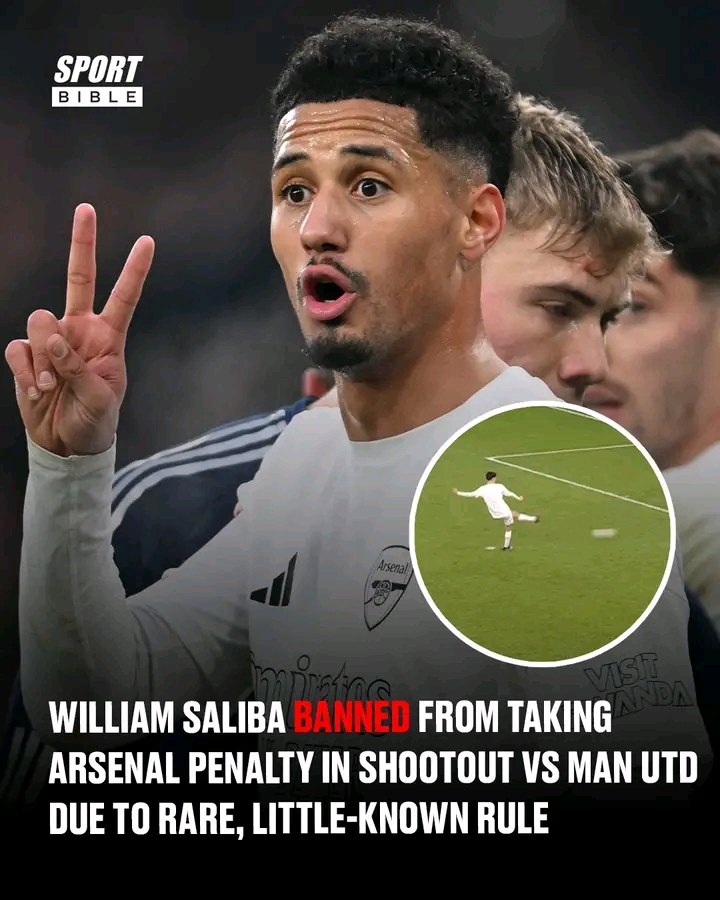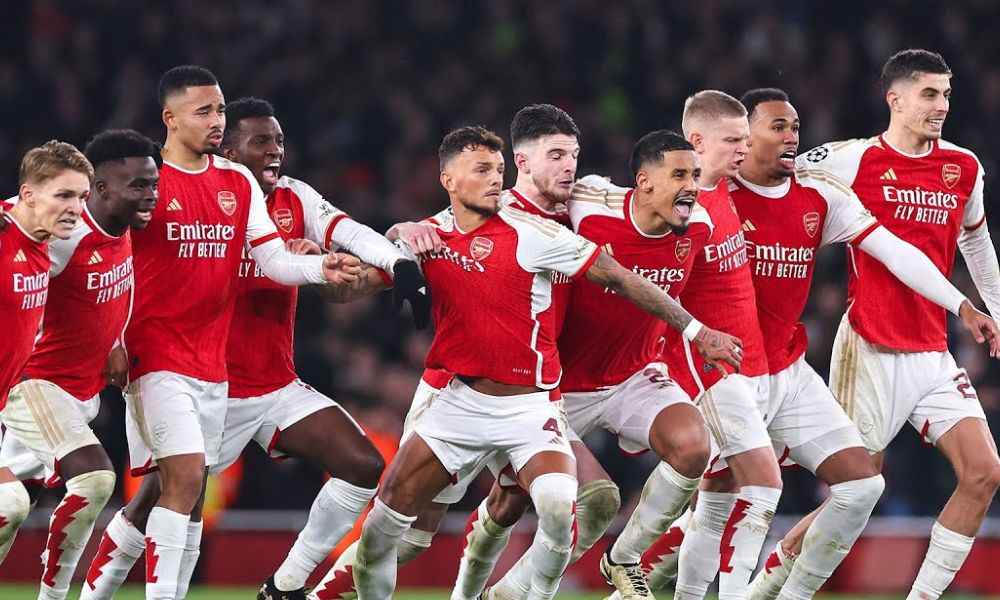William Saliba banned from taking Arsenal penalty in shootout vs Man Utd due to little-known rule

A fascinating rule in football came to light during Arsenal’s FA Cup penalty shootout loss to Manchester United, preventing defender William Saliba from taking part in the decisive spot kicks. The dramatic match, which ended in a 5-3 penalty shootout victory for United, revealed an interesting regulation that many fans and observers were previously unaware of.
The story unfolded after 120 minutes of intense football at the Emirates Stadium, where neither team could find a decisive goal in normal or extra time. The match was particularly notable as United played the final 30 minutes with only 10 men following Diogo Dalot’s dismissal for a second yellow card.
When it came time for penalties, Arsenal manager Mikel Arteta faced an unexpected restriction. Despite Saliba being available and on the pitch after playing the full match, he was not allowed to participate in the shootout. The reason? A little-known FA rule states that teams must have an equal number of penalty takers in a shootout. Since United had been reduced to 10 players, Arsenal had to exclude one player from their penalty-taking lineup to match their opponents’ numbers.
This rule meant that even if the shootout had gone beyond the initial five penalties per team, the sequence would simply restart with the first takers rather than allowing the excluded player to step up. In this case, that would have meant Bruno Fernandes and Martin Odegaard taking their second penalties before Saliba could take his first.
What makes the situation even more intriguing is Arsenal’s decision-making process. The club chose to keep goalkeeper David Raya as a potential penalty taker while excluding Saliba from the lineup. This choice proved academic in the end, as the shootout concluded before all players had taken their kicks, with United winning 5-3.
The penalty drama had actually begun during regular time when Arsenal were awarded a controversial spot kick. The incident involved Harry Maguire and Kai Havertz, with many observers questioning whether there was sufficient contact to warrant a penalty. United goalkeeper Altay Bayindir proved to be the hero, saving Martin Odegaard’s attempt during normal time before later denying Kai Havertz in the shootout.
United’s victory was made all the more impressive by the fact they played a significant portion of the match with 10 men. After Dalot’s sending off, they showed remarkable resilience to force penalties and ultimately progress to the next round of the competition.
The match’s conclusion highlighted several interesting aspects of modern football rules and tactical decision-making. The regulation requiring equal numbers of penalty takers, while logical in principle, creates interesting tactical considerations for managers when one team has been reduced to 10 players. It forces them to make difficult choices about which players to exclude from the shootout, potentially affecting their team’s chances of success.
United’s manager Ruben Amorim expressed his satisfaction with the result in his post-match comments, noting that his team had shown improvement from their previous encounter with Arsenal. He particularly praised their set-piece performance and fighting spirit, especially after being reduced to 10 men. The manager emphasized how he had felt from the start that it would be United’s day, highlighting the strong connection between the team and their traveling supporters.
The penalty shootout itself became a testament to the importance of preparation and mental strength in football. United’s players showed remarkable composure under pressure, while Arsenal’s missed opportunities proved costly. The save by Bayindir from Havertz’s penalty ultimately proved decisive, demonstrating how individual moments can define cup competitions.
This match and its unusual rule application adds another chapter to the rich history of FA Cup encounters between these two storied clubs. It also serves as a reminder of how even at the highest level of football, there are still rules and regulations that can surprise both players and fans alike.
The incident has sparked discussion about the fairness and logic of such rules in modern football. While the requirement for equal numbers in a penalty shootout makes sense from a competitive balance perspective, some argue that it unnecessarily restricts teams who have maintained their full complement of players through good discipline.
Looking beyond this specific match, the rule has implications for how teams approach extra time when they have a numerical advantage. Knowing that they will have to exclude a player from the penalty shootout might influence tactical decisions about substitutions and playing style in the closing stages of matches.
From Arsenal’s perspective, the decision to exclude Saliba rather than another player will likely be analyzed and debated. The choice to keep their goalkeeper as a potential penalty taker while excluding an outfield player represents an interesting tactical preference that might influence future similar situations.
The match itself will be remembered not just for this rule peculiarity but for its drama and intensity. It showcased the enduring appeal of the FA Cup, where tactical nuances, individual brilliance, and sometimes obscure regulations can combine to create memorable football moments.
For Manchester United, this victory represents a significant step in their FA Cup defense and demonstrates their ability to overcome adversity, particularly after playing with 10 men for an extended period. The result will boost their confidence as they continue their campaign in multiple competitions.
As for Arsenal, while the defeat and the circumstances surrounding it will be disappointing, the experience provides valuable lessons about the importance of being prepared for every eventuality in cup competition, including knowledge of all regulations that might affect crucial moments like penalty shootouts.
This incident serves as a reminder that football, despite its global popularity and long history, can still produce situations that educate and surprise even the most knowledgeable followers of the sport. It also highlights how important it is for teams and managers to be aware of all rules and regulations, as they can have a significant impact on crucial moments in important matches.















